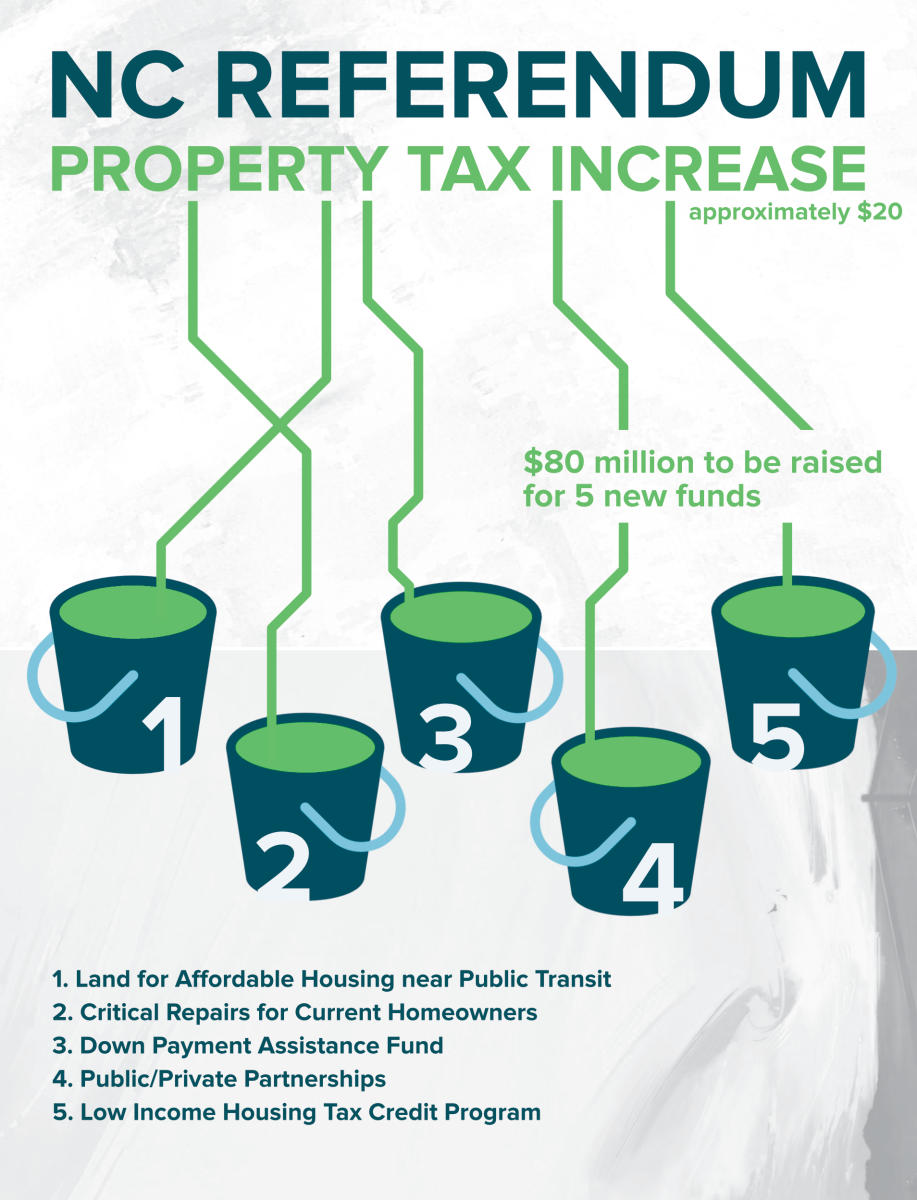*Editor’s Note: This article was updated on Oct. 15 to more accurately reflect information given by Rachel Zeitler. The graphic has been updated as well.
Affordable housing has been a topic of local debate for a few election cycles now, especially with the mayoral race in 2017 and now, with the 2020 election. On the ballot this year, voters will have a direct say in policymaking by voting on a referendum for the 2020 Affordable Housing Bond.
According to Rachel Zeitler, the director of advocacy for Habitat for Humanity of Wake County and a member of the Affordable Housing Bond campaign committee, the bond intends to raise $80 million by increasing the property taxes on property by approximately $20. This money will then be funneled into five “funding buckets,” as she described them, that will then be used to fund different aspects of affordable housing.
According to Zeitler, the first bucket of funding will be used to purchase land for affordable housing that is in close proximity to public transportation sites, stating public transportation access is key to combating the housing crisis in Raleigh.
“For the average household, housing and transportation together make up more than half of the average household’s budget,” Zeitler said. “If we can be intentional about our planning decisions and make sure that affordable housing and public transportation are located close to one another, then we can really work to mitigate some of those expenses.”
Two other funding buckets are focused on investments and homeownership, Zeitler said. The first of the mentioned buckets provides money and resources for current homeowners to make critical repairs to their home, while the second bucket is directed to first-time homebuyers and would provide financial resources to help offset the costs of a down payment.
“Down payments are often the biggest barrier to people entering the market and buying their first home,” Zeitler said. “The Down Payment Assistance Fund would provide assistance for that. For qualified homebuyers, that would mitigate that large barrier of having to save such a significant amount for a down payment.”
According to Zeitler, the fourth bucket, public/private partnerships, is the largest and most discussed funding bucket. This bucket will support nonprofit housing organizations and fund partnerships for small-scale development of affordable housing units. It will also fund a permanent supportive housing program for people who are experiencing chronic homelessness. This bucket will expand the number of affordable rental homes that are available.
Lastly, the fifth bucket provides funding for the Low-Income Housing Tax Credit program, Zeitler said. This is a federal program that provides funding for affordable rental housing across the country. However, in order for states and localities to take advantage of this program, they have to contribute some of the gap financing.
Zeitler said this bond will allow people, those who are housing secure and not, to have a say in helping out their community members. She stressed how the COVID-19 pandemic and its impact on essential workers has really shown the importance of affordable housing.
“Affordable housing matters to everyone,” Zeitler said. “Even if you’re secure in your housing, are your neighbors and community members secure in theirs? In order to have a healthy, thriving community, we need housing options at a variety of price points. Essential workers and people who are still out working often can’t afford the cost of housing in Raleigh or throughout the region.”
Zeitler continued that a lack of affordable housing actually will impact the economy. She stressed that the more competition there is for a small amount of affordable housing, the more the price of this housing will increase.
“That’s why it’s so important to make sure that we are really looking at this now,” Zeitler said. “We need to make plans now and find solutions now, one of which is funding. That’s why this bond is important because we really need to increase our supply of housing and make sure that the affordable housing issue we have now does not get worse.”








